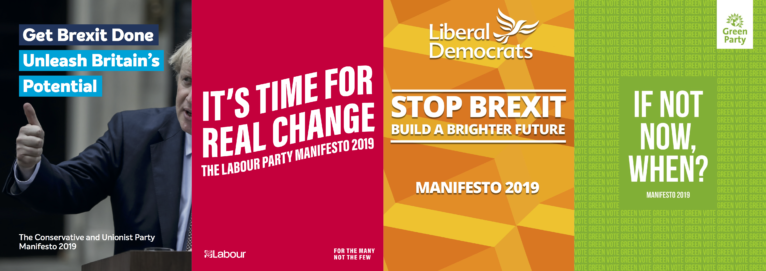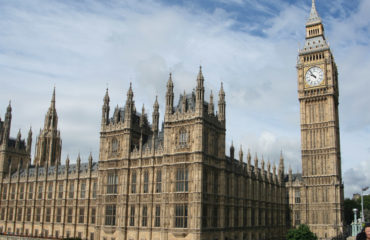The election manifestos and the environment: Six unanswered questions

The 2019 General Election is finally in full swing following the publication of the party manifestos. Manifestos play a vital function in modern democracies and analysing them rightly constitutes an important sub-area of political science research. Given the background to this particular election, they are being keenly studied by environmentalists to establish what they reveal about each party’s position on the environment and climate change – two vital concerns that have been riding high in the opinion polls for some time.
2019: The environmental election?
In the initial stages of the campaign, several parties made very big eye-catching promises which, if acted upon, would completely transform the landscape of UK environmental policy and politics. But what do the manifestos themselves say about Brexit and the way it relates to the environment? So far, this matter has attracted much less media attention, even though the vast majority of UK environmental policy was originally made with or by the EU.
In this blog, I explore where EU-UK environmental relations may be heading after the election result is announced, drawing on a close reading of the manifestos published by the Conservatives, Labour, the Lib Dems and the Greens. Because of space constraints I put aside the important but complex matter of how the election is playing out in the devolved administrations of the UK.
The UK’s membership status
Prior to the election, three broad Brexit-related topics had emerged as targets of environmental pressure group campaigning. The first relates to the status of the UK’s membership of the EU and, flowing from that, the type of environmental relationship that the UK builds with the EU 27. On this sub-topic, the Green manifesto is probably the clearest. Its ‘remain and transform’ approach would involve holding a peoples’ vote and campaigning for remain, at the same time as rebalancing power in the EU through empowering the European Parliament and allowing citizens to propose reforms to the EU treaties. It is a measure of how far EU-level politics has greened in the last year or so that many of their specific proposals (e.g. a border adjustment tax, greater transparency in trade negotiations, CAP reform etc.) are being actively considered by the new Commission President, Ursula von der Leyen.
Although the Lib Dems’ broad stance on the EU may appear unambiguous (‘Stop Brexit’ is emblazoned across its manifesto), the text offers precious little detail on how the UK would behave in the EU if it decided to remain a member. Labour on the other hand proposes to ‘Get Brexit sorted in six months’ i.e. renegotiate the Withdrawal Treaty to include “robust and legally binding protections” that establish a level playing field with the EU, “dynamic alignment” on environmental and social protections, and “continued participation in EU agencies” presumably including the European Environment Agency (EEA). Its “sensible leave deal” would then be put to voters in another legally-binding referendum. If voters opt to remain, Labour will pursue a “radical reform” of the EU; if they don’t, Labour will honour the oucome but “work constructively with the EU … to the mutual benefit of the UK and the EU”.
Finally, under the Conservatives’ ‘Get Brexit Done’ approach, the UK would leave the EU in January 2020, with no extension of the existing transition period (which ends in December 2020), at which point it would exit both the single market and the customs union. Once outside the EU, the party would seek to “reinvigorate its relationship with Europe” based on “free trade and friendly cooperation, not on the EU’s treaties or EU law”.
The first unanswered question is therefore how closely will the UK track EU environmental standards after Brexit? In his Foreword to the Conservative manifesto, Boris Johnson pointedly maintains that “where we choose” to diverge “we will be able to do things differently and better”. The UK Foreign Secretary has said that he is adamant that the UK will not align with any EU rules. The potential difference between these two positions is of course not explored in the manifesto. Yet the EU is equally adamant that the further the UK diverges from its rules, the more restricted its access to the single market will be. The idea of ‘dynamic alignment’ on some issues may be one solution, but which formulation would Labour be prepared to sign up to? Its manifesto does not explain.
The second unanswered question relates to environmental non-regression, which was in Mrs May’s withdrawal deal but was decisively removed by Boris Johnson when he took over the negotiations. Non-regression is one of Greener UK’s major campaign demands but is intimately tied to the Irish border question and perhaps unsurprisingly none of the manifestos explicitly commits to implementing it (in either a binding or a non-binding from).
Policy and governance gaps at UK level
The next topic relates to the fate of UK level policy and governance after Brexit. Since the referendum, the environmental community has gradually realised – and taken active steps to mitigate – the imminent threat that policy and governance gaps will open up at the national level. In response, the May Government published an Environment Bill that would establish a new Office of Environmental Protection (OEP) to shoulder some of the vital responsibilities that are currently discharged by EU bodies and passed a Withdrawal Act that will copy paste all existing EU environmental policies into UK law on Brexit day.
The Conservative manifesto commits to adopting the Environment Bill to “protect and restore” the environment and establishing a fully “independent” OEP. It would also “legislate to ensure high standards” of workers’ rights and environmental protection, something which it could conceivably achieve via the Environment Bill or the Withdrawal Agreement and Implementation Bill or both. However, environmentalists will be dismayed at the continuing references to the Red Tape Challenge, which will ensure that all rules – new and existing – are “sensible and proportionate” and “work for British companies”.
The Lib Dems are of course emphatically committed to halting Brexit, but their manifesto nonetheless commits to establishing an OEP, which will be “fully independent” and have sufficient “powers and resources to enforce compliance”. While much less explicit on the likelihood of Brexit, Labour commits to introducing a specialised environmental tribunal to adjudicate on environmental cases, but makes no mention of the OEP or the Environment Bill. However, it does promise to adopt new legal acts on nature and clean air. Finally, in their manifesto, the Greens promise to establish an Environmental Protection Commission – “one integrated body to enforce environmental protections”. If the UK remains in the EU, it will be important to ensure that it or any new body does not duplicate the functions of the European Commission and the EEA.
The third unanswered question therefore relates to the fate of all the new policy ideas in the still to be adopted Environment Bill. Will they be grafted into some of the other new flagship environment bills promised by the parties (e.g. Labour’s clear air act or the Lib Dems’ nature act) or could some conceivably be dropped? Greener UK has worked hard to raise the level of ambition in the current bill and the fact that it is now in legislative limbo is causing mounting concern within the NGO community. Crucially, the Conservatives only explicitly commit to establishing the OEP and new “legal policy targets including for air quality”.
The fourth unanswered question relates to the fate of the many hundreds of EU policies that will be copy pasted into national law after Brexit (creating what lawyers refer to as “retained EU law”). This is certainly not a trivial matter given the massive importance of EU law in contemporary national environmental policy making, but none of the manifestos even mentions it, thus compounding fears that the retained laws will quietly zombify after Brexit day.
Future trading relationships
The final topic area relates to the vexed issue of cross-border trade. Again, it is especially relevant to the parties that countenance some form of Brexit. Labour broadly commits to “uphold the highest environmental and social regulations in all our trade relations”; it pledges to “never downgrade standards as ‘barriers’ to trade”. It also commits to pursue “transparency and parliamentary scrutiny of trade and investment agreements”. The Conservatives maintain that they “will not compromise on …. high environmental protection” standards in new trade negotiations but do not appear to commit to raising existing standards (via what could be termed the environmental progression principle) or enhancing greater democratic scrutiny.
Both the Greens and the Lib Dems fail to offer much more clarity, although they argue that future EU trade deals should maintain and where possible enhance environmental standards. The Greens for example pledge to increase parliamentary scrutiny of trade negotiations and put an end to the use of investor state dispute mechanisms. Meanwhile the Lib Dems offer to “strengthen climate and environmental goals in EU trade and investment” agreements” and refuse to strike new deals with countries “that have policies counter to the Paris Agreement”.
The fifth question therefore relates to the future of UK trade policy. For the first time in 46 years, the country has an opportunity to completely re-set its approach to negotiating and implementing free trade deals. The EU has its own very well-established approach with a variety of significant environmental elements. So precisely which of these elements will the UK retain and which will it jettison? The manifestos offer very few clues.
The sixth and final unanswered question concerns no deal, the matter which has done more to bedevil and delay Brexit than any other. Thus far the Government has committed many billions of pounds to no deal planning and so voters would be entitled to expect at least some further detail. Yet, aside from one passing reference in the Labour manifesto to ‘ruling out’ a no deal, none of the four manifestos has anything to say about it, which is striking given how likely it is to dominate public debate as the clock counts down to the end of the current transition in December 2020.
Answering the six unanswered questions
Those drafting manifestos must strike a difficult balance between offering too much and too little detail. The Conservatives in particular have opted to play it safe by producing a short and focused manifesto. But voters could be forgiven for expecting more than just a broad vision of where policy will head in the next five years. Crucially, none of the manifestos analysed here offers much detail across the three topical areas of EU-UK environmental relations, and some do not even offer a broad vision. Politicians now have the remainder of the campaign to answer six important environmental questions that were largely overlooked in their party’s manifestos, but will inevitably become more salient as soon as the election is out of the way.
About the author
Professor Andy Jordan is Professor of Environmental Sciences at the University of East Anglia and a founding co-chair of Brexit & Environment.





The Climate Crisis and UK Policy | Guest Post | The Family Patch
30th November 2019 at 10:05 am[…] Brexit and Environment: The election manifestos and the environment: Six unanswered questions […]